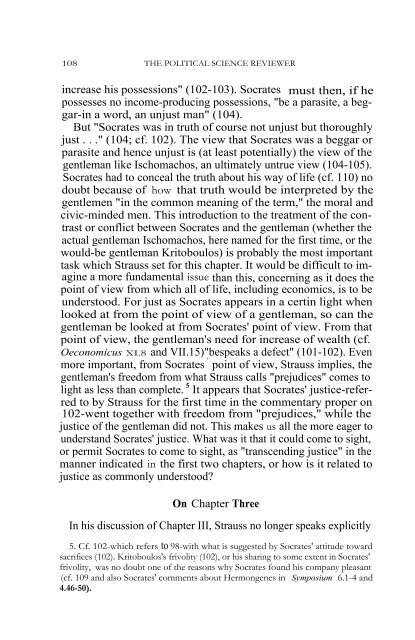Strauss on Xenophon's Socrates Xenophon's Socratic Discourse: An ...
Strauss on Xenophon's Socrates Xenophon's Socratic Discourse: An ...
Strauss on Xenophon's Socrates Xenophon's Socratic Discourse: An ...
Create successful ePaper yourself
Turn your PDF publications into a flip-book with our unique Google optimized e-Paper software.
108 THE POLITICAL SCIENCE REVIEWER<br />
increase his possessi<strong>on</strong>s" (102-103). <strong>Socrates</strong> must then, if he<br />
possesses no income-producing possessi<strong>on</strong>s, "be a parasite, a beggar-in<br />
a word, an unjust man" (104).<br />
But "<strong>Socrates</strong> was in truth of course not unjust but thoroughly<br />
just . . ." (104; cf. 102). The view that <strong>Socrates</strong> was a beggar or<br />
parasite and hence unjust is (at least potentially) the view of the<br />
gentleman like Ischomachos, an ultimately untrue view (104-105).<br />
<strong>Socrates</strong> had to c<strong>on</strong>ceal the truth about his way of life (cf. 110) no<br />
doubt because of how that truth would be interpreted by the<br />
gentlemen "in the comm<strong>on</strong> meaning of the term," the moral and<br />
civic-minded men. This introducti<strong>on</strong> to the treatment of the c<strong>on</strong>trast<br />
or c<strong>on</strong>flict between <strong>Socrates</strong> and the gentleman (whether the<br />
actual gentleman Ischomachos, here named for the first time, or the<br />
would-be gentleman Kritoboulos) is probably the most important<br />
task which <str<strong>on</strong>g>Strauss</str<strong>on</strong>g> set for this chapter. It would be difficult to imagine<br />
a more fundamental issue than this, c<strong>on</strong>cerning as it does the<br />
point of view from which all of life, including ec<strong>on</strong>omics, is to be<br />
understood. For just as <strong>Socrates</strong> appears in a certin light when<br />
looked at from the point of view of a gentleman, so can the<br />
gentleman be looked at from <strong>Socrates</strong>' point of view. From that<br />
point of view, the gentleman's need for increase of wealth (cf.<br />
Oec<strong>on</strong>omicus XI.8 and VII.15)"bespeaks a defect" (101-102). Even<br />
more important, from <strong>Socrates</strong> ' point of view, <str<strong>on</strong>g>Strauss</str<strong>on</strong>g> implies, the<br />
gentleman's freedom from what <str<strong>on</strong>g>Strauss</str<strong>on</strong>g> calls "prejudices" comes to<br />
light as less than complete. 5 It appears that <strong>Socrates</strong>' justice-referred<br />
to by <str<strong>on</strong>g>Strauss</str<strong>on</strong>g> for the first time in the commentary proper <strong>on</strong><br />
102-went together with freedom from "prejudices," while the<br />
justice of the gentleman did not. This makes us all the more eager to<br />
understand <strong>Socrates</strong>' justice. What was it that it could come to sight,<br />
or permit <strong>Socrates</strong> to come to sight, as "transcending justice" in the<br />
manner indicated in the first two chapters, or how is it related to<br />
justice as comm<strong>on</strong>ly understood?<br />
On Chapter Three<br />
In his discussi<strong>on</strong> of Chapter III, <str<strong>on</strong>g>Strauss</str<strong>on</strong>g> no l<strong>on</strong>ger speaks explicitly<br />
5. Cf. 102-which refers to 98-with what is suggested by <strong>Socrates</strong>' attitude toward<br />
sacrifices (102). Kritoboulos's frivolity (102), or his sharing to some extent in <strong>Socrates</strong>'<br />
frivolity, was no doubt <strong>on</strong>e of the reas<strong>on</strong>s why <strong>Socrates</strong> found his company pleasant<br />
(cf. 109 and also <strong>Socrates</strong>' comments about Herm<strong>on</strong>genes in Symposium 6.1-4 and<br />
4.46-50).

















